

How Oil Harms Animals and Plants in Marine Environments. The type of oil spilled matters because different types of oil behave differently in the environment, and animals and birds are affected differently by different types of oil.
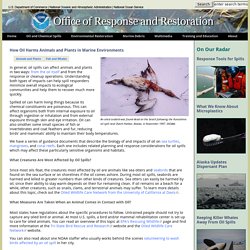
However, it's not so easy to say which kind is worst. First, we should distinguish between "light" and "heavy" oils. Fuel oils, such as gasoline and diesel fuel, are very "light" oils. Light oils are very volatile (they evaporate relatively quickly), so they usually don't remain for long in the aquatic or marine environment (typically no longer than a few days). If they spread out on the water, as they do when they are accidentally spilled, they will evaporate relatively quickly.
However, while they are present, light oils present two significant hazards. In contrast, very "heavy" oils (like bunker oils, which are used to fuel ships) look black and may be sticky for a time until they weather sufficiently, but even then they can persist in the environment for months or even years if not removed. Celtic language. Gulf Spill Dispersants Surprisingly Long-lasting. Massive amounts of chemical dispersants pumped into the Gulf of Mexico to break up the BP oil spill remained deep underwater for months, new research shows.
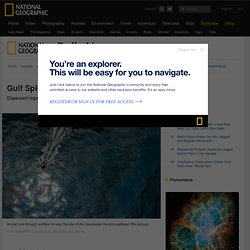
In an unprecedented tactic, U.S. authorities pumped some 800,000 gallons (3,028,000 liters) of dispersants directly into the flow of oil at the Deepwater Horizon wellhead, at about 4,000 and 5,000 feet (1,200 and 1,500 meters) deep. Most of the dispersant was applied in May and June, and the wellhead was capped in July. No one knew how effectively the dispersants would work. But a new analysis shows the dispersants lingered for months pretty much right where they were put—trapped in subsurface plumes of oil and gas. How does oil impact marine life? Looking for Information about Oil Spills? Oil spills—some large, more often small—happen along the coasts, Great Lakes, and major rivers of the United States nearly every day.
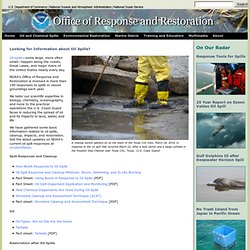
NOAA's Office of Response and Restoration is involved in more than 100 responses to spills or vessel groundings each year. We tailor our scientific expertise in biology, chemistry, oceanography, and more to the practical operations the U.S. Video: BP CEO says 'I'm sorry' for Gulf oil spill, but denies existence of underwater plumes - National Political Buzz. Amazingly, a full 40 days after the beginning of the BP oil spill the company had still not officially said "sorry" to the American public.
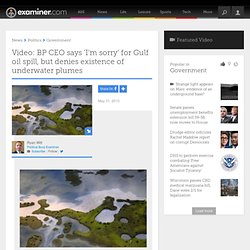
Yesterday, BP CEO Tony Hayward changed that pattern. When asked what he would say to the people of Louisiana Hayward stated, "We're sorry for the massive disruption it's caused their lives. There's no one who wants this over more than I do. I would like my life back. " Hayward also stressed the company's sincere effort to stop the leak and stop the oil from reaching the coastline. At the same time, many feel that BP is still trying to avoid future financial liability with their statements and actions. BP has also been accused of using chemical dispersants which essentially try to "hide" the oil by keeping it from coming to to the surface. Deepwater Horizon oil spill. What Causes Oil Spills. The term "oil spill" typically evokes images of crude oil pouring out of an oil tanker in the sea due to an accident, but it can be used to refer to any type of oil release.
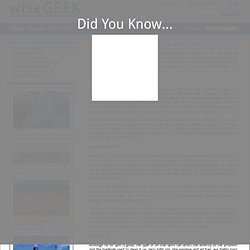
Ocean oil spills are among the most commonly depicted and catastrophic forms, though they can also occur on land. Accidents frequently cause spills as oil is released from a container or pipeline due to damage or mechanical failure. How This Oceanic Robotic Drone Will Clean Up Oil Spills. After sailing more than 40 thousand nautical kilometers and into 14 countries on Unreasonable at Sea, we ported in Spain for our culminating event.
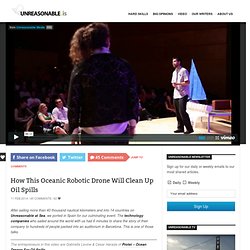
The technology companies who sailed around the world with us had 6 minutes to share the story of their company to hundreds of people packed into an auditorium in Barcelona. This is one of those talks. The entrepreneurs in this video are Gabriella Levine & Cesar Harada of Protei – Ocean Drones For Oil Spills. Company Description in 100 Words or Less The ocean covers more than 70% of the surface of our planet and yet remains largely unexplored.
What if we were capable of deploying sailing robots anywhere, anytime in the ocean? Protei is a durable, wind-powered solution to remediate such problems. Major Milestones. Oil Spills: Sad But True. Imagine you’re a killer whale.
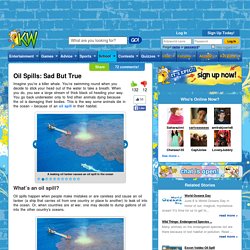
You’re swimming round when you decide to stick your head out of the water to take a breath. When you do, you see a large stream of thick black oil heading your way. You go back underwater only to find other animals dying because the oil is damaging their bodies. TreeHugger. A federal study of sea otters in Prince William Sound, Alaska, where the Exxon Valdez supertanker spilled around 30,000,000 gallons of oil about 25 years ago (the second largest spill after the Deepwater Horizon disaster) has concluded that the otters have returned to pre-spill numbers.
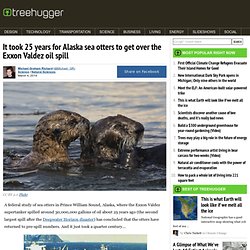
And it just took a quarter century... Wikipedia/CC BY 2.0.